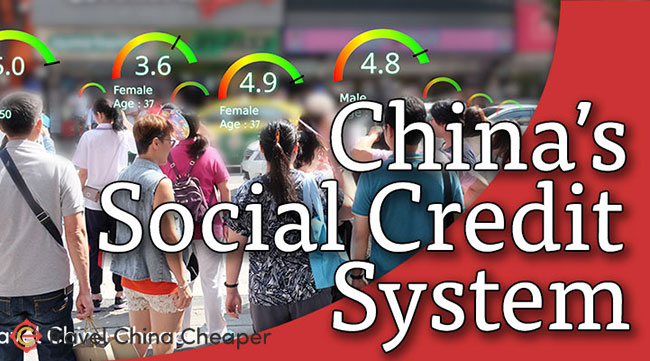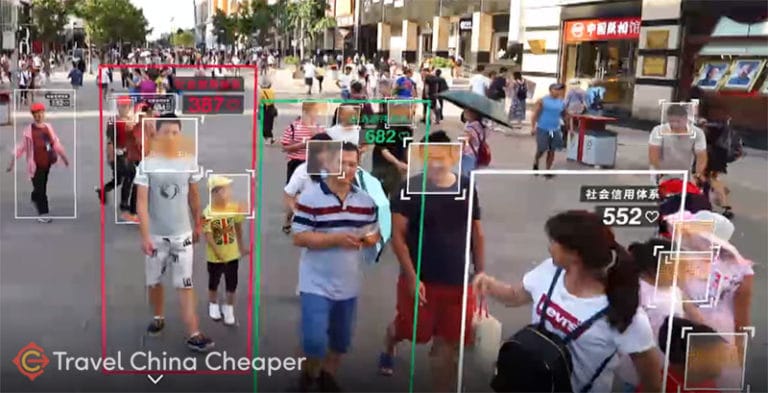What is China’s social credit system? Perhaps you’ve heard of the China foreigner grading system and wondering how either of these programs will affect you as a foreigner trying to get or renew a visa to China? We’re going to discuss exactly what both of these programs are and how they might affect you.

If there is one thing I’ve learned about the Chinese government in the over 10 years I’ve been traveling around China, it’s that they are obsessed with control. So I wasn’t surprised at all when I heard the announcement in 2014 that China was rolling out a new social credit system for its citizens.
But what is this program and is it similar to China’s foreigner grading system? Is it possible the foreign expat grading system could also prevent you from getting a visa?
Will you as a foreigner have a social credit score in China??
Below, we’re going to answer these questions by walking through both China’s social credit system as well as China’s foreigner grading system to see how they relate and what it means for you.
What is China’s Social Credit System?
So what is China’s social credit system anyway? In short, it’s a numerical grading system that allows the Chinese government to monitor and control the behavior of its citizens. In Chinese, it’s referred to as 社会信用体系 or Shèhuì xìnyòng tǐxì.
Taking lessons from how we earn good and bad credit in the financial world, in this case, Chinese citizens can move up and down in their social score based on their behavior.

What’s more is that, when Chinese move up and down in social credit, they are granted or restricted from certain privileges like flying on airplanes, getting good jobs, or sending one’s kids to top schools, among many others.
Sound strange? Just wait until you hear how invasive it is on one’s private life and personal information.
Apparently, local city councils across China work in partnership with tech firms to monitor social credit. For example, telecoms providers can wreak havoc on someone’s social credit if someone spends too much time playing videogames online or posts fake news on social media (I’m guessing politically sensitive content also qualifies).
Facial recognition is also used to dock points for driver’s that run red lights or pedestrians jaywalking across streets.
Curious about what earns good social credit? Based on the little information the Chinese government shares, donating money to charity or having a high education can improve your score. So can more obscure things like being a parent or walking your dog with a leash.
What’s the Point of China’s Social Credit System?
The guiding Chinese principle behind the social credit system, as noted by the Washington Post, is that “Keeping trust is glorious and breaking trust is disgraceful.”
When you visit China, you’ll notice that the Chinese government plays an active role in things like Internet censorship to control and culturally shape its population in the manner that keeps the Communist Party in power.
The social credit system is just one of many means for the Chinese government to further monitor and culturally shape its population. This one, however, has an incentive structure built in.
China’s Social Credit System and Foreign Tourists
So what does China’s social credit system mean for you as a foreign tourist to China? In short, absolutely nothing.
The program focuses entirely on Chinese citizens and some sources, including this article published in Foreign Policy Magazine, claim that China’s social credit system isn’t even real.
So if you’re worried that you lack the social credit to travel to China and that you’ll be monitored to the point where you’ll have your own social credit score before you leave, you can rest easy and focus your attention on seeing the best sights China has to offer.
If you’re an expat doing work in China, however, you’ll have to contend with another, very real system: China’s foreign expat grading system.
What is China’s Foreigner Grading System?
You may be sighing breaths of relief knowing the Chinese social credit system could be nothing more than myth. But what about China’s foreigner grading system?
For folks traveling to China in the hopes of landing a job, the scoring system for expats is something you’ll have to deal with to acquire a work permit.
But if you’re traveling to China solely for travel and applying for a travel visa, then you don’t need to worry about the scoring system for expats whatsoever.
The scoring system for expats is also nothing new and has already been in place for several years. But if you’re not familiar with China’s foreigner grading system, to bring you up to speed, it’s a points-based system to vet foreigners looking for work in China.
Foreign Expat Tiers in China Explained
The vetting system in China gives points for specific, qualifying conditions. For example, you’ll get more points for having a doctorate (20 points) versus just a bachelor’s degree (10 points) at university. You’ll even get more points for being between the ages of 26-45 (15 points) versus being 18-25 (10 points) or older (0-10 points).
The points are then added up to separate you into one of three separate tiers:
- Tier A: Requiring a massive 85 points, these folks primarily have professions in middle-upper management, come from Fortune 500 firms or famous academic institutions, and are applying for really senior roles in China. This is a seriously small group.
- Tier B: This is where most foreign workers in China fall and it takes between 60-85 points to qualify for this tier. Most Tier B foreigners have at least a Bachelor’s Degree along with two years working experience and fill skill based positions like teaching English in China.
- Tier C: Foreigners that score under 60 points qualify for Tier C. Unfortunately for those in Tier C, jobs are generally short-term and subject to quotas. You may or may not be given a visa if you fall in this category.
You can learn more about the tiers and where you would likely qualify from this excellent article on China-Briefing. The key takeaway is that China is trying to become more picky and choosy on foreign workers coming to China.
Another takeaway is it may also be more difficult for recent college graduates to land a teaching job without any experience. If this describes you, I’d either consider investing in a TEFL to earn you more points when applying for ESL jobs in China.
Final Thoughts | China’s Grading Systems
There are plenty of reasons to be concerned about China’s new social credit system. But you shouldn’t stress about it as the program does not monitor foreign travelers and is likely not even a real thing at this point.
However, don’t expect to be entirely free of Big Brother while in China and investing in a VPN will at least help you maintain Internet privacy.
China’s social credit system should also not be confused with China’s foreigner grading system, which could impact your ability to get a work permit. To receive a work permit in China, you’ll want to ensure you have enough points to get your required visa.
But the good news is travel visas to China continue to remain easy enough to get. You can also take advantage of the best China visa services I recommend to make getting a visa easier.







